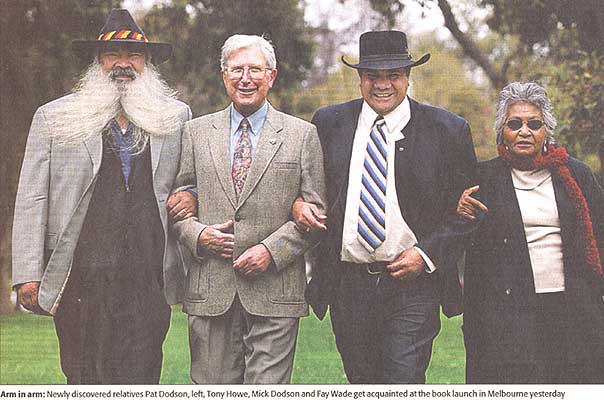 |
The Dodsons' white songline photo - Colin Murty By Stuart Rintoul - August 30, 2003
AS he rises to speak, Pat Dodson is overcome with emotion, choking back the tears as he recalls those who helped shape him into the man he became, and what he calls the "marvellous discovery" of a new extended and non-Aboriginal family. This was the emotional unveiling of Paddy's Road, the biography of Australia's most respected indigenous leader, Pat Dodson. It is a story that joins ancient Aboriginal songlines and the great Irish diaspora, but this week it also sparked a remarkable merging of an Irish-Australian-Aboriginal family after 100 years.
Two weeks ago, The Weekend Australian Magazine featured a story based on the Dodson biography. It described how Dodson's great-grandfather, Joe Fagan, arrived from Ireland with his parents, John and Matilda, on a ship called the David McIvor in 1857, and how as a young man he went north, where he worked as a stockman and formed a relationship with an Aboriginal woman, Nawurla.
In Finley, NSW, retired farmer Keith Fegan, 79, saw the story and felt – as he would describe it later – "quite taken aback".
He sent the magazine to his cousin, Pam Robbins, in Perth, who had spent the past decade compiling the threads of their large Irish-Australian family, with a letter suggesting this might be the story of the member of their family she always called "the missing one".
What they knew, and Pat Dodson did not until this week, was that John and Matilda Fegan (for it now seems likely this was the spelling of their surname, although it was spelt in a variety of ways) had not one but seven children, Joe being the eldest.
As the Fegan family, and their descendants, including Tony Howe, heard the story over the years, when Joe was a young man he and his father quarrelled, and Joe was sent packing. He jumped on a horse and went north, and they never heard from him again. Some of the family believed he became a missionary and was "eaten by the blacks".
Matilda, who is remembered in family stories as a strong and wilful woman, grieved for her eldest son from that day, never knowing what became of him. She died, still heartbroken, in 1913, followed by John in 1915. They were buried in paupers' graves in the Victorian town of Echuca.
John, an illiterate, had worked as a servant in the Omagh asylum before leaving Ireland following the Great Famine. A report into the "state of the lunatics" in this institution in 1846 records six people simply as "idiot". In Australia, he worked as a labourer in Geelong and on the gang that built the railway to Echuca, where he and Matilda selected a tiny block of land at a place known as Nine Mile Point at Koyuga, nine miles (about 14km) south of Echuca. They called their home "Tyrone" – a sentimental recollection of the county in Ireland where they married – and they went broke on it.
The house, or part of it, still stands at the Nine Mile and it has its own secret.
Over the years, those who have lived there have told of seeing a ghost – a man dressed roughly and wearing a stockman's hat. He would come in by the side gate, walk into the house, up the hall and into what would have been John and Matilda's bedroom.
Pam Robbins believes it has been Joe's spirit trying to come home to his mother.
From Paddy's Road, written by Kevin Keeffe, the family knows that when Joe died in 1917, he left his estate, a half-share in a property worth 2000 pounds, to Elizabeth Grace Fagan – the daughter he had with Nawurla – but the notorious chief protector of Aborigines, Auber Octavius Neville, took the money and denied it to her for the next 35 years. It was just one episode in generations of abuse and prejudice the family endured.
But the strands of Pat Dodson's family now stretch back beyond John (born in County Monaghan in 1832) and Matilda, to John's parents, William Fegan and Bessie McCoy. In addition to Joe Fegan, born in 1856, there are also John and Matilda's other children: Billy (born 1858), John (1861), Albert (Pam Robbin's great-grandfather, 1863), Eliza Jane (1865), Fanny (1868), Maggie (1870) and Samuel (1872), and their children, and their children – his direct cousins.
For Pat and Mick Dodson, and their extended family, including sister Fay Wade, who travelled from Broome to be at yesterday's launch in Melbourne, discovering a new extended non-Aboriginal family has come with the great bonus of the way the Fegans have embraced them, which might say a great deal about the course of reconciliation.
Asked about his feelings on discovering his connection to the celebrated Dodsons, Tony Howe, 67, whose grandfather was Sam Fegan, said: "It's very exciting. I'm quite proud."
In Finley, Keith Fegan said he felt "surprised and rather pleased", while in Perth, Pam Robbins said: "It's fantastic. I'm terribly excited, really delighted to know Joe had a life with a child and a family that is descended from him and acknowledge him. It's just beautiful that this sort of thing unites people."
|